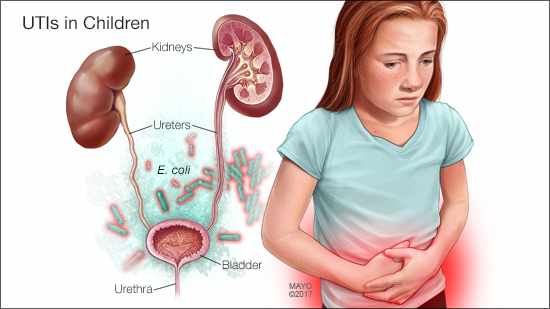Healthy Living
Young children under the age of 5 are at the risk of urinary tract infections

Young children are as sensitive as they are carefree which leaves them susceptible to a number of infections and health concerns that demand special care and attention constantly. In the initial few years of their life, kids generally tend to catch a lot of bugs. Cold and other infections hence become extremely common among them. One of the most severe infections that can happen to kids is that of urinary tract infection (UTI). While it is mostly believed that UTI occurs only in adults, it has been reported that up to 8% of girls and 2% of boys get a UTI by the age of 5 years.
The urinary tract of the body includes the bladder and kidneys along with the tubes that connect them. When germs find a way into the urinary tract, infection is caused. In kids, UTI usually occurs when bacteria from their skin or poop enter the urinary tract and multiply. Girls are more likely to get UTI as their urethra is shorter, which makes it easier for the bacteria from the anus to easily enter the vagina and urethra. In the case of boys, those who are not circumcised have a slightly higher risk of UTIs. Children with a problem called reflux (vesicoureteral reflux or VUR) are more at the risk of infections. At times some children are even born with this problem or other birth defects of the urinary system that lead to reflux.
Some children are more likely to get UTIs if they already have some problems with their bladder or kidneys. Urine flow tends to block and germs get a chance to multiply due to the narrowing in the urinary tract.
What enhances the trouble is that the symptoms of this infection are hard to notice in kids. However, it is very crucial that the child receives adequate treatment on time before the UTI transforms into a more serious kidney infection.
If the UTI happens in older kids, the symptoms are mostly clear. The main symptoms being:
- Lower belly pain
- Back or side pain
- An urgent need to pee or frequent peeing
- Some kids also lose control over their bladder and may wet the bed
- Drops of blood might also be seen in the urine, or the urine is pink
However, when it comes to younger children, very careful attention and observation are required to take note of these symptoms. When it comes to infants, the symptoms are likely to be more general including:
– Fever
– Fussiness
– Little interest in food
Other UTI symptoms are:
- Burning or pain when your child pees
- Foul-smelling or cloudy pee
- An urgent need to go, and then only peeing a few drops
- Fever
- Nausea or vomiting
- Diarrhea
The major cause as explained above for UTI is the entering of a bacteria into the bladder. These bacteria can be commonly found on the skin around the anus and/or near the vagina. Usually, bacteria are not there in the urinary tract but some of the following things facilitate the entry of the bacteria and their stay:
- A problem in the urinary tract called vesicoureteral reflux which is mostly present at birth allows urine to flow back up into the ureters and kidneys
- Neurological conditions like spinal deformities may make it difficult for the bladder to fill and empty in proper fashion
- Birth defects or changes in the structure of the urinary tract
- Not enough and frequent urination during the day
- After using the bathroom, wiping from back (near the anus) to front in girls can bring bacteria to the opening where the urine comes out
As applicable for most life situations, prevention certainly is better than the cure in case of UTIs to ensure that your kids are not caught by these infections. Some of the preventive measures that can be adopted include:
o Hygiene is the most basic and most essential habit that must be inculcated in the child. Hygiene, both personal (of one’s intimate areas) as well as of the washrooms and surroundings are equally important.
o Parents must make sure that their children are not exposed to unclean washrooms and are well versed in their cleanliness practice.
o Regularly changing the diapers of the baby is also something that parents should keep in mind to prevent bacteria from growing.
o Girls must be instructed to wipe from front to back to prevent bacteria in poop from getting into the vagina and urinary tract.
o Kids should be encouraged to go to the bathroom as soon as they feel the urge and not to hold it in.
o Bubble baths should be ideally avoided especially girls and perfumed soaps should not be used.
o To improve airflow and prevent bacteria from growing, cotton underwear and not nylon ones should be preferred.
o Kids must be encouraged to drink lots of water which would help flush bacteria out of the urinary tract. A good intake of fiber in the form of vegetables and fruits prevents constipation. Constipation itself is a risk factor in causing UTI.
Contributed by Dr. Antony Robert Charles, Consultant Paediatric Surgery, Columbia Asia Hospital Hebbal





























